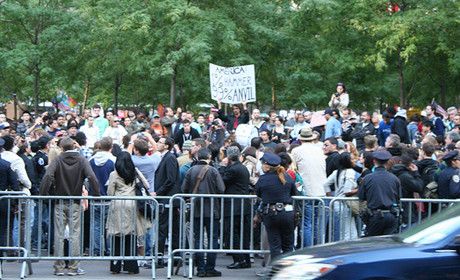
Demonstrators taking part in Occupy Wall Street prior to the protest being cleared by police
Credit: BlaisOne on Flickr. Some rights reservedExecutive editor of the Associated Press Kathleen Carroll has explained why a warning was reportedly sent to staff about how they use Twitter, claiming that the company's policies were "violated" when journalists tweeted about the arrest of colleagues covering the Occupy Wall Street protests on Tuesday.
In a memo to staff yesterday (Wednesday), Carroll responded to "chatter" online which broke out after reports claimed AP staff had been told their tweets revealing arrests of colleagues broke company policy on the use of social media, which she claimed "mostly misses the point".
In her memo she warned staff that in situations where the whereabouts of journalists are unknown, "talking about it while things are still uncertain can endanger them", adding that "the issue around yesterday’s tweets was not how quickly we got word out that two of our people had been rounded up" but the fact that the journalists had been arrested.
"In this case, the two were released after a few hours. We aren't always that lucky," she said.
"Those of you who live in the United States may not think about this much since your work rarely puts you in the kind of jeopardy that many of your colleagues elsewhere endure with great regularity. AP's international staffers know from bitter, often personal experience that that kind of information may make things worse.
"Even in the United States, it's not outlandish to think that a tweet that's taken by someone in authority to be opinionated or sarcastic could lead to one of our staffers being held longer than necessary. Imagine you're that staffer. Would you want to be kept behind bars by a colleague's thoughtless tweet?"
An earlier memo to staff to remind them of the company's policy was initially reported on by New York Magazine, causing much debate about how journalists should handle breaking news and social media.
Technology site Gigaom gives a useful round-up of some of the debate taking place online as a result, with author Matthew Ingram claiming that companies such as Associated Press are "fighting a losing battle" by trying to keep breaking events for the wire.
"As New York Times media reporter Brian Stelter ― who has been at the vanguard of using Twitter (and Tumblr) for reporting on events like the tornado in Missouri ― noted, if Twitter is beating the wire then maybe the wire should speed up. And how can you expect your reporters not to post comments about what is happening to them during such an event? That's the whole point of Twitter in the first place."
Free daily newsletter
If you like our news and feature articles, you can sign up to receive our free daily (Mon-Fri) email newsletter (mobile friendly).
Related articles
- Six self-care tips for journalists to stay sane during the general election
- RISJ Digital News Report 2024: Three essential points for your newsroom
- Seven tips for using LinkedIn as a freelance journalist
- Journalists are happy to be disconnecting from platforms, should news organisations be worried?
- Protecting journalists on social media, with Valérie Bélair-Gagnon









